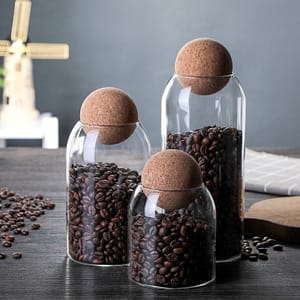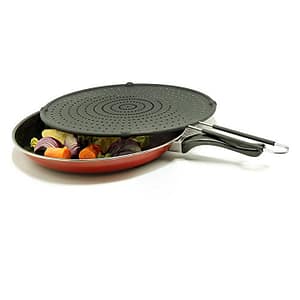
Blog Details

The Ultimate Guide to Removing Fish Smell from Pans
There’s nothing better than a beautifully seared piece of fish, but what do you do when that lingering smell won’t leave your frying pan?
That persistent, fishy odor can ruin your next meal, even if it’s something sweet. Don’t throw out your pan just yet! We’ve gathered the most effective methods to completely neutralize that stubborn smell and get your cookware smelling as good as new.
1. The Salt & Lemon Method (Our Go-To Fix)
This is a simple, natural solution that uses two powerful kitchen staples. Lemon’s acidity breaks down the odor-causing compounds, while salt acts as a gentle abrasive to scrub away residue.
- Step 1: Sprinkle a generous amount of coarse salt onto the pan.
- Step 2: Cut a lemon in half and use the cut side to scrub the salt all over the surface of the pan.
- Step 3: Let it sit for 5-10 minutes, then rinse and wash with warm, soapy water.
2. The Vinegar & Water Solution
For a deeper clean, vinegar is an incredibly effective deodorizer.
- Step 1: Fill the pan with a solution of equal parts white vinegar and water.
- Step 2: Bring the mixture to a simmer on the stove for about 5 minutes.
- Step 3: Turn off the heat and let it cool completely. Then, pour out the mixture and wash the pan as usual. The heat helps the vinegar penetrate and neutralize the odors.
3. The Baking Soda Paste
Baking soda is a renowned natural deodorizer that works wonders on surfaces.
- Step 1: Create a thick paste by mixing baking soda with a little bit of water.
- Step 2: Apply the paste to the inside of the pan and let it sit for at least 30 minutes, or even overnight for tough smells.
- Step 3: Use a soft brush or sponge to scrub the pan, then rinse and wash.
4. The Coffee Grounds Hack
This might sound strange, but coffee grounds absorb odors incredibly well.
- Step 1: Spread used coffee grounds over the bottom of the pan.
- Step 2: Let them sit for a few hours. The longer the better.
- Step 3: Discard the grounds and wash the pan. This is especially useful if you’re in a pinch!
Pro Tip for Non-Stick Pans:
Be gentle with non-stick surfaces, like the ones on our Sweettreats Non-stick Copper Skillet. Avoid abrasive sponges and harsh chemicals. The lemon and salt or baking soda paste methods are the best choice to protect the non-stick coating. You can also make sure your oven temperature is accurate by using our Cooking Baked Goods Meat Thermometer.
FAQ Section
Can I use this method on a cast iron pan?
Yes, but be cautious with too much water and acid, which can strip the seasoning. The salt and lemon method is generally safe if you re-season the pan afterward. The baking soda paste is a very safe option.
What causes the fish smell to linger so much?
The strong smell is caused by amines, which are compounds released from fish as it decomposes. These amines are absorbed by porous surfaces and can be hard to remove with just soap and water.
Can I prevent the fish smell from starting?
Yes! Ensure your fish is very fresh. When cooking, you can add a little bit of lemon juice or a sprig of fresh herbs to the pan, which can help mask and prevent odors from setting in.
Our Products
-
Unique Book Coffee Cup – Stack of Books Design
₹1,682.00 – ₹1,696.00Price range: ₹1,682.00 through ₹1,696.00 Select options This product has multiple variants. The options may be chosen on the product page -
Salt & Pepper Electric Grinder – Rechargeable
₹2,436.00 Select options This product has multiple variants. The options may be chosen on the product page -
Glass Storage Jar – Cork Lid & Minimalist Design
₹2,564.00 Select options This product has multiple variants. The options may be chosen on the product page -
Food grade Silicone Splash Screen – Mess-Free Cooking
₹2,159.00 Select options This product has multiple variants. The options may be chosen on the product page -
Stainless Steel Corn Cob Holders – Mess-Free
₹1,086.00 Select options This product has multiple variants. The options may be chosen on the product page -
Silicone Donut Mold – Makes 6 Non-Stick Donuts
₹833.00 Select options This product has multiple variants. The options may be chosen on the product page
Products
-
Unique Book Coffee Cup – Stack of Books Design
₹1,682.00 – ₹1,696.00Price range: ₹1,682.00 through ₹1,696.00 Select options This product has multiple variants. The options may be chosen on the product page -
Salt & Pepper Electric Grinder – Rechargeable
₹2,436.00 Select options This product has multiple variants. The options may be chosen on the product page -
Glass Storage Jar – Cork Lid & Minimalist Design
₹2,564.00 Select options This product has multiple variants. The options may be chosen on the product page -
Food grade Silicone Splash Screen – Mess-Free Cooking
₹2,159.00 Select options This product has multiple variants. The options may be chosen on the product page










